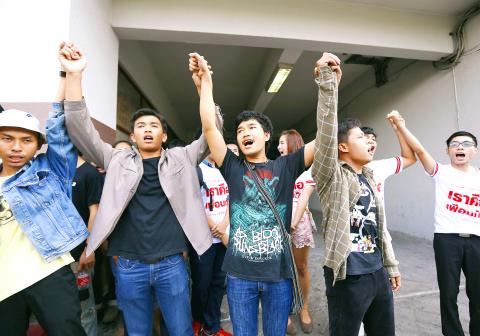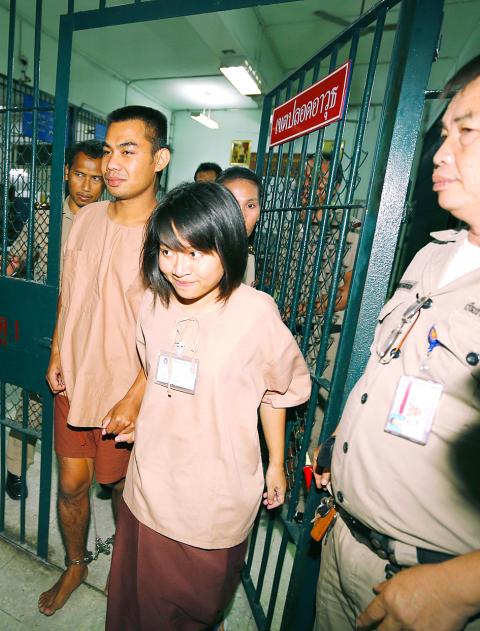Thailand sentenced two students to jail yesterday for two-and-a-half years for insulting the monarchy in a university play, in a case that drew dozens of activists to a protest outside the court in defiance of a ban on demonstrations.
The country has been under martial law since a coup in May last year. The convictions come amid anxiety over the health of ailing King Bhumibol Adulyadej, 87, and the issue of royal succession.
Thailand’s lese-majeste law is the world’s harshest and makes it a crime to defame, insult or threaten the king, queen or heir to the throne or regent. The junta has stepped up a campaign against perceived insults to the monarchy since it took power.

Photo: EPA
Patiwat Saraiyaem, 23, and Pornthip Munkong, 26, were both convicted on a count of lese-majeste, which carries a maximum of 15 years in prison.
“Both suspects violated the 112 law and receive a five- year prison sentence ... reduced by half,” a judge said, referring to the penal code section.
The term was cut because both confessed, the judge said.

Photo: EPA
Patiwat appeared in court in leg irons. The pair were arrested in August over a satirical play they put on more than a year earlier at Bangkok’s Thammasat University.
The play, called The Wolf Bride, marked the 40th anniversary of an October 1973 military crackdown on a pro-democracy student protest at the university. Set in a fictional kingdom, it featured a fictional king and his adviser.
In Thailand, lese-majeste complaints can be filed by anyone, against anyone, and are always investigated by police.
Pornthip, who directed the play, said she was not afraid of prison.
“I’ve learned many things — dancing, playing music and I’ve made many friends,” Pornthip told reporters before the verdict, referring to her time in detention since her arrest.
About 40 student gathered outside the court wearing white shirts with the words “We are friends” in Thai and English. Some raised a three-finger salute that has come to represent opposition to the junta.
The declining health of King Bhumibol, the world’s longest-reigning monarch, has formed the backdrop to Thailand’s 10-year political crisis spawned by competition for power between populist former Thai prime minister Thaksin Shinawatra and the establishment dominated by the royalist military.
The king has long been seen as a figure of unity above the political fray. Crown Prince Maha Vajiralongkorn has yet to command his father’s level of popular support.
Pornthip’s mother, Nuan Mungkong, told reporters the pair would not appeal: “We want this matter over.”

Shamans in Peru on Monday gathered for an annual New Year’s ritual where they made predictions for the year to come, including illness for US President Donald Trump and the downfall of Venezuelan President Nicolas Maduro. “The United States should prepare itself because Donald Trump will fall seriously ill,” Juan de Dios Garcia proclaimed as he gathered with other shamans on a beach in southern Lima, dressed in traditional Andean ponchos and headdresses, and sprinkling flowers on the sand. The shamans carried large posters of world leaders, over which they crossed swords and burned incense, some of which they stomped on. In this

Indonesia yesterday began enforcing its newly ratified penal code, replacing a Dutch-era criminal law that had governed the country for more than 80 years and marking a major shift in its legal landscape. Since proclaiming independence in 1945, the Southeast Asian country had continued to operate under a colonial framework widely criticized as outdated and misaligned with Indonesia’s social values. Efforts to revise the code stalled for decades as lawmakers debated how to balance human rights, religious norms and local traditions in the world’s most populous Muslim-majority nation. The 345-page Indonesian Penal Code, known as the KUHP, was passed in 2022. It

‘DISRESPECTFUL’: Katie Miller, the wife of Trump’s most influential adviser, drew ire by posting an image of Greenland in the colors of the US flag, captioning it ‘SOON’ US President Donald Trump on Sunday doubled down on his claim that Greenland should become part of the US, despite calls by the Danish prime minister to stop “threatening” the territory. Washington’s military intervention in Venezuela has reignited fears for Greenland, which Trump has repeatedly said he wants to annex, given its strategic location in the arctic. While aboard Air Force One en route to Washington, Trump reiterated the goal. “We need Greenland from the standpoint of national security, and Denmark is not going to be able to do it,” he said in response to a reporter’s question. “We’ll worry about Greenland in

‘TRUMP’S LONG GAME’: Minnesota Governor Tim Walz said that while fraud was a serious issue, the US president was politicizing it to defund programs for Minnesotans US President Donald Trump’s administration on Tuesday said it was auditing immigration cases involving US citizens of Somalian origin to detect fraud that could lead to denaturalization, or revocation of citizenship, while also announcing a freeze of childcare funds to Minnesota and demanding an audit of some daycare centers. “Under US law, if an individual procures citizenship on a fraudulent basis, that is grounds for denaturalization,” US Department of Homeland Security Assistant Secretary Tricia McLaughlin said in a statement. Denaturalization cases are rare and can take years. About 11 cases were pursued per year between 1990 and 2017, the Immigrant Legal Resource